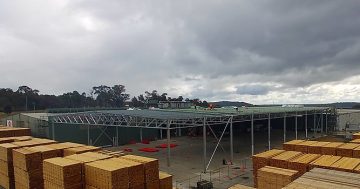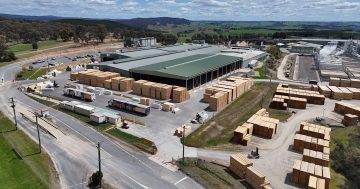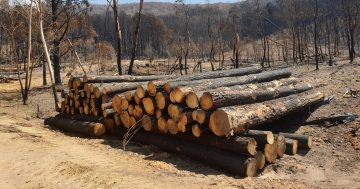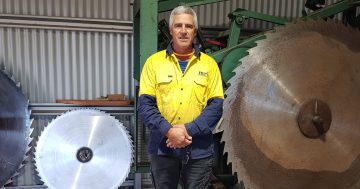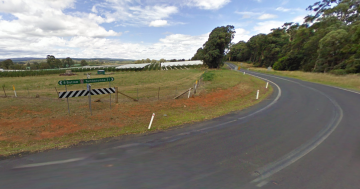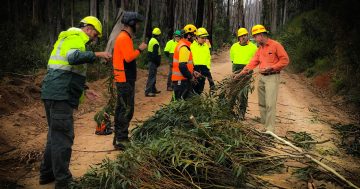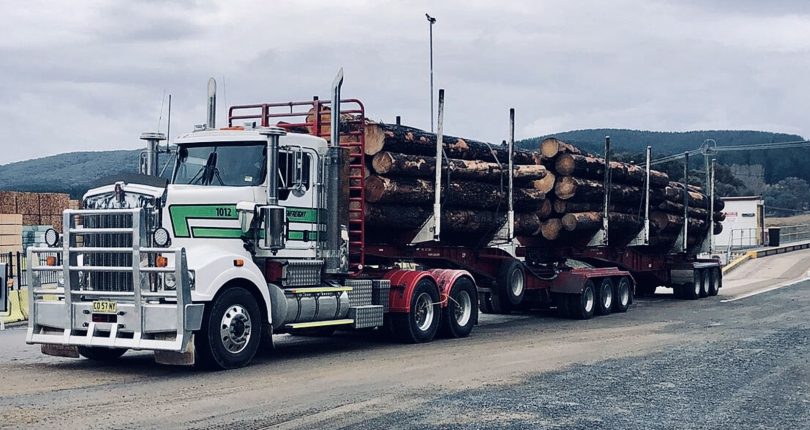
The last load of salvaged burnt timber arrived at Hyne Timber Tumbarumba Mill on 4 May, 15 months after massive bushfires devastated the region. Photo: Supplied.
Imagine looping slats of timber around the world twice.
There’s a mill in Tumbarumba that doesn’t have to conjure up that fantasy because it has achieved that in just over a year.
And on Tuesday, 4 May, Hyne Timber Tumbarumba Mill celebrated the achievement as the last log truck carrying salvaged, burnt logs from the 2019-2020 Black Summer bushfires was waved onto the facility.
The unprecedented 15 months of salvage harvesting has seen more than 1.6 million burnt plantation pine logs processed at the mill.
In doing so, the burnt bark is removed and the logs are processed into quality, sawn timber.
It represents 75.5 million linear metres of timber which has been processed from salvaged logs – the equivalent quantity to wrap around the world twice.
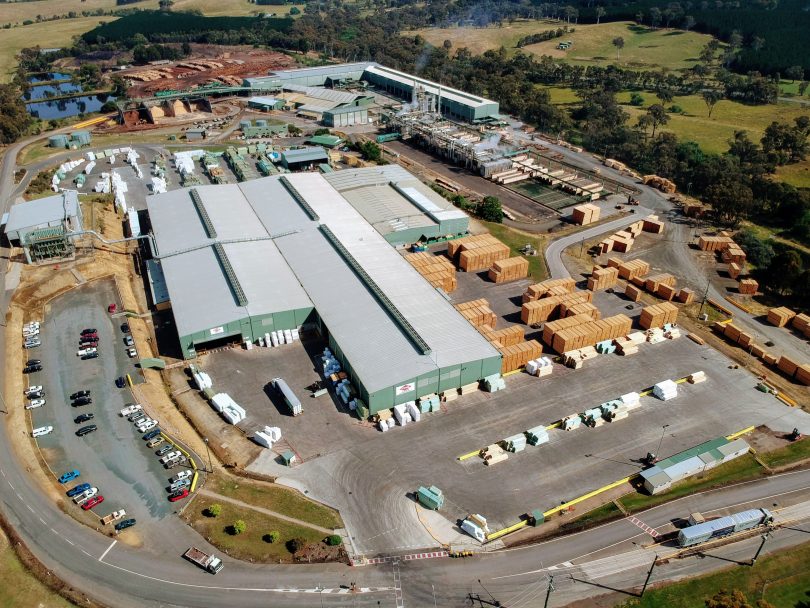
Employees at Hyne Timber Tumbarumba Mill have been praised for their efforts in processing 75.5 million linear metres of burnt local logs from the Black Summer bushfires. Photo: Supplied.
Hyne Timber’s CEO, Jon Kleinschmidt, said this final log truck marks the end of a historic event of collaboration and incredibly hard work.
“To still be accepting burnt logs 15 months after the fires has completely exceeded industry expectations of three to six months,” he said.
Mr Kleinschmidt said the company was able to maintain the mill’s capacity and supply of locally grown timber throughout a period of high demand, which he attributes to the Federal Government’s HomeBuilder stimulus scheme.
The economy-boosting initiative offering $25,000 cash grants for buyers of newly built homes or people renovating their property was announced in June 2020 and extended in November of the same year.
But it was the endeavours of locals for who Mr Kleinschmidt saved his highest praise.
“The efforts of all involved, from the growers, the harvesting crews, the haulers, the staff here at the Tumbarumba Mill and our byproduct customers has been remarkable and deserves to be celebrated,” he said.
“I know for our team here onsite, it has been hard, coupled with the uncertainty of the future.”
But it wasn’t all thanks. There was time for celebration in Tumbarumba as the old made room for the new.
Mr Kleinschmidt said the mill was not only able to celebrate delivery of the milestone final load, but the fact there will be ongoing job security in the aftermath of the devastating bushfires.
Close to 40 per cent of the region’s plantation feedstock was lost in the bushfires and there was a pervasive black cloud over the enterprise regarding ongoing supply from mid-2021, after the salvaged burnt timber was processed.
“We have secured logs from suppliers to source some logs from further afield, securing jobs here onsite which is welcome news for our team and the community of Tumbarumba,” said Mr Kleinschmidt.
Additionally, the mill has opened its books with several job vacancies.
“We encourage people to consider joining our resilient business, industry and commitment to the supply of quality, Aussie timber for our construction sector,” said Mr Kleinschmidt.
A number of the growers were represented at the Tumbarumba Mill to mark the occasion and enjoy an onsite barbecue with employees.
Forestry Corporation of NSW regional manager Dean Anderson was also in attendance. He said it is good to see that despite the devastation from the bushfires, much of the damaged pine plantation could be salvaged.
He said that coming to Hyne Timber Tumbarumba Mill to see the last of their burnt logs being unloaded for processing 15 months after the bushfire was incredible.
“Just the Dunn’s Road fire was one-and-a-half times the size of the ACT, covering an area of 3500 square kilometres,” he said.
Mr Anderson said more than 45,000 hectares of pine plantations – which is just under 40 per cent of the area planted – were impacted by bushfires in the local area.
“More than half of the area affected by fire was too young to salvage, and our focus has been on getting all the trees older than 19 years, and as much as possible of those older than 12 years,” he said.
“We have managed to just about achieve this, except for a few steep areas – salvaging more than 2.7 million tonnes in the Tumut and Tumbarumba region.
“This makes the salvage operation one of the longest and largest in history – a testament to the resilience of the local forest industry.”







